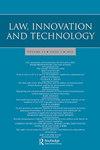Recognising rights for robots: Can we? Will we? Should we?
Q1 Social Sciences
引用次数: 17
Abstract
ABSTRACT This article considers the law’s response to the emergence of robots and artificial intelligence (AI), and whether they should be considered as legal persons and accordingly the bearers of legal rights. We analyse the regulatory issues raised by robot rights through three questions: (i) could robots be granted rights? (ii) will robots be granted rights? and (iii) should robots be granted rights? On the question of whether we can recognise robot rights we examine how the law has treated different categories of legal persons and non-persons historically, finding that the concept of legal personhood is fluid and so arguably could be extended to include robots. However, as can be seen from the current debate in Intellectual Property (IP) law, AI and robots have not been recognised as the bearers of IP rights despite their ability to create and innovate, suggesting that the answer to the question of whether we will grant rights to robots is less certain. Finally, whether we should recognise rights for robots will depend on the intended purpose of regulatory reform.承认机器人的权利:我们能吗?我们会吗?我们应该吗?
摘要本文考虑了法律对机器人和人工智能(AI)出现的反应,以及它们是否应该被视为法人并相应地被视为合法权利的承担者。我们通过三个问题来分析机器人权利提出的监管问题:(i)机器人是否可以被授予权利?(ii)机器人会被授予权利吗?以及(iii)机器人是否应该被授予权利?关于我们是否可以承认机器人权利的问题,我们研究了法律在历史上如何对待不同类别的法人和非法人,发现法人的概念是流动的,因此可以说可以扩展到包括机器人。然而,从目前知识产权法的辩论中可以看出,尽管人工智能和机器人有创造和创新的能力,但它们并没有被承认为知识产权的持有者,这表明我们是否会授予机器人权利的问题的答案还不太确定。最后,我们是否应该承认机器人的权利将取决于监管改革的预期目的。
本文章由计算机程序翻译,如有差异,请以英文原文为准。
求助全文
约1分钟内获得全文
求助全文
来源期刊

Law, Innovation and Technology
Social Sciences-Law
CiteScore
4.50
自引率
0.00%
发文量
18
期刊介绍:
Stem cell research, cloning, GMOs ... How do regulations affect such emerging technologies? What impact do new technologies have on law? And can we rely on technology itself as a regulatory tool? The meeting of law and technology is rapidly becoming an increasingly significant (and controversial) topic. Law, Innovation and Technology is, however, the only journal to engage fully with it, setting an innovative and distinctive agenda for lawyers, ethicists and policy makers. Spanning ICTs, biotechnologies, nanotechnologies, neurotechnologies, robotics and AI, it offers a unique forum for the highest level of reflection on this essential area.
 求助内容:
求助内容: 应助结果提醒方式:
应助结果提醒方式:


